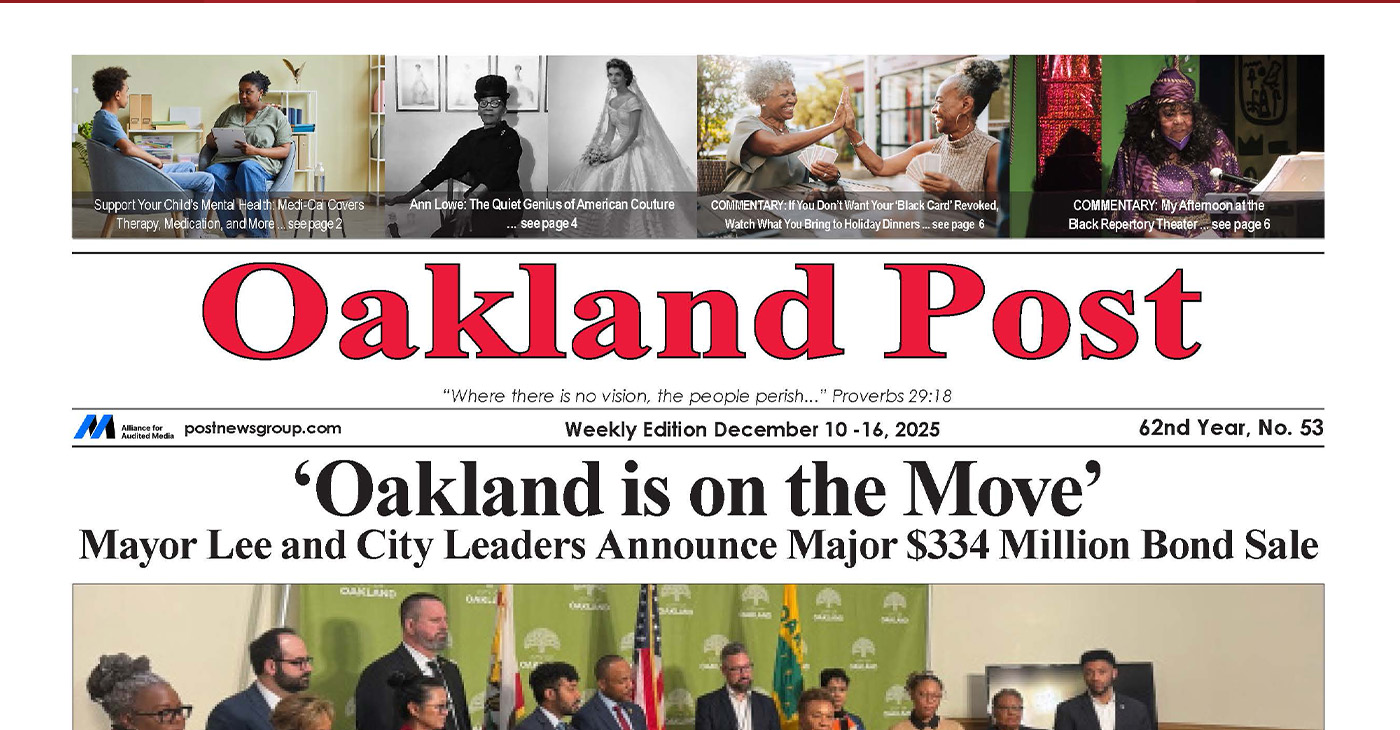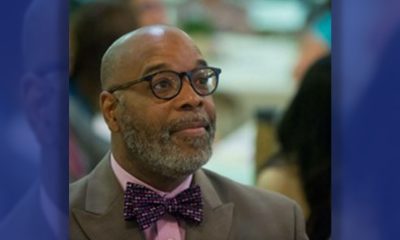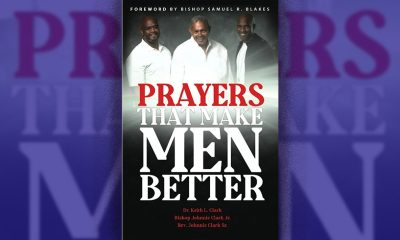Opinion
What I Learn When I Have Lunch at Cook County Jail

On my birthday this year, I continued my tradition of going to the Cook County Jail to have lunch with some of the 5,552 people who are inmates there. These visits remind me of the humanity of those who are in trouble — and of the inhumanity, even idiocy, of our criminal justice system.
Despite the first steps toward prison reform, the United States still locks up a higher percentage of its population than any other country — even more than repressive nations like China. There are some 2.3 million people locked up in America in 1,719 state prisons, 109 federal prisons, 1,772 juvenile correction facilities, 3,163 local jails, as well as what are called Indian Country Jails, immigration detention facilities and more.
If prisons were a city, it would be larger than Philadelphia or Dallas, and one of the country’s top 10 in population. In total, about $80 billion a year is spent on correction facilities, compared to the $68 billion spent by the Department of Education.
About 612,000 of this number are in local jails, but that number is misleading. A staggering 10.6 million people go to jail in any one year. Most are released shortly after posting bail or getting out without it. Over two-thirds of the people in jail have not been convicted of any crime. These are overwhelmingly poor people who cannot afford bail.
Prison and jail populations are still disproportionately people of color. African Americans are 12 percent of the country’s population but 33 percent of federal and state prisons’ population. Recently, from 2009 to 2016, the African-American prison population has fallen by about 17 percent, declining more rapidly than the white prison population, which is down about 10 percent. The scourge of the opioid epidemic has significantly contributed to the number of whites in trouble.
Nonviolent offenders make up a significant proportion of the incarcerated — particularly in federal prisons. State and local prisons and jails tend to have more inmates charged with property or violent crimes. Too many are there because of petty violations of the terms of their release from previous charges, not even from committing a new offense.
Inmates, almost by definition, are disproportionately low income. They are “down on their luck,” people struggling under the intense pressures of poverty. They tend to be people who suffer from the diseases of depression, alcoholism or drug abuse.
When I break bread with these people, I always find them to be more intelligent than people think, more humane than people think, more curious and open to experience than people think.
These are not serial murderers or rapists. They are overwhelmingly people who erred or did wrong but are not bad people.
We need a lot more reform of our judicial system and particularly of our system of incarceration. We should be doing far more rehabilitation and far less incarceration.
With 10 million people going to jail each year — and the overwhelming number in jail at any one time not convicted of anything — one thing we should do is register them to vote. The inmates I spoke with were stunned to learn that they were still eligible to vote — and eager to be signed up.
If they were to be registered and to vote, they might help make a difference in the judges that get elected, in the sentences that get handed out, in the injustices that are structured into our justice system. They know better than most that while there are some truly violent people that deserve incarceration, the vast majority need a hand up, not another shackle of more debt, a bad record, a bleaker future.
Illinois, under Governor Pritzker, has set the pace. Legislation was enacted that will turn the county jail into a temporary precinct that will enable “pretrial detainees” — those who are detained but not convicted of anything — to register and vote. That provides a model for states and localities across the country.
These are citizens who have the right to vote. We should make it possible for them to exercise that right.
Advice
COMMENTARY: If You Don’t Want Your ‘Black Card’ Revoked, Watch What You Bring to Holiday Dinners
From Thanksgiving to Christmas to New Year’s Day, whether it’s the dining room table or the bid whist (Spades? Uno, anyone?) table, your card may be in danger.

By Wanda Ravernell
Post Staff
From the fourth week of November to the first week in January, if you are of African descent, but particularly African American, certain violations of cultural etiquette will get your ‘Black card’ revoked.
From Thanksgiving to Christmas to New Year’s Day, whether it’s the dining room table or the bid whist (Spades? Uno, anyone?) table, your card may be in danger.
It could take until Super Bowl Sunday for reinstatement.
I don’t know much about the card table, but for years I was on probation by the ‘Aunties,’ the givers and takers of Black cards.
How I Got into Trouble
It was 1970-something and I was influenced by the health food movement that emerged from the hippie era. A vegetarian (which was then considered sacrilegious by most Black people I knew) prepared me a simple meal: grated cheese over steamed broccoli, lentils, and brown rice.
I introduced the broccoli dish at the Friday night supper with my aunt and grandfather. She pronounced the bright green broccoli undone, but she ate it. (I did not, of course, try brown rice on them.)
I knew that I would be allowed back in the kitchen when she attempted the dish, but the broccoli had been cooked to death. (Y’all remember when ALL vegetables, not just greens, were cooked to mush?)
My Black card, which had been revoked was then reattained because they ate what I prepared and imitated it.
Over the decades, various transgressions have become normalized. I remember when having a smoked turkey neck instead of a ham hock in collard greens was greeted with mumblings and murmurings at both the dining room and card tables. Then came vegan versions with just olive oil (What? No Crisco? No bacon, at least?) and garlic. And now my husband stir fries his collards in a wok.
But No Matter How Things Have Changed…
At holiday meals, there are assigned tasks. Uncle Jack chopped raw onions when needed. Uncle Buddy made the fruit salad for Easter. My mother brought the greens in winter, macaroni salad in summer. Aunt Deanie did the macaroni and cheese, and the great aunts, my deceased grandmother’s sisters, oversaw the preparation of the roast beef, turkey, and ham. My father, if he were present, did the carving.
These designations/assignments were binding agreements that could stand up in a court of law. Do not violate the law of assignments by bringing some other version of a tried-and-true dish, even if you call it a new ‘cheese and noodle item’ to ‘try out.’ The auntie lawgivers know what you are trying to do. It’s called a menu coup d’état, and they are not having it.
The time for experiments is in your own home: your spouse and kids are the Guinea pigs.
My mother’s variation of a classic that I detested from that Sunday to the present was adding crushed pineapple to mashed sweet potatoes. A relative stops by, tries it, and then it can be introduced as an add-on to the standard holiday menu.
My Aunt Vivian’s concoctions from Good Housekeeping or Ladies’ Home Journal magazine also made it to the Black people’s tables all over the country in the form of a green bean casserole.
What Not to Do and How Did It Cross Your Mind?
People are, of all things holy, preparing mac ‘n’ cheese with so much sugar it tastes like custard with noodles in it.
Also showing up in the wrong places: raisins. Raisins have been reported in the stuffing (makes no sense unless it’s in a ‘sweet meats’ dish), in a pan of corn bread, and – heresy in the Black kitchen – the MAC ‘n’ CHEESE.
These are not mere allegations: There is photographic evidence of these Black card violations, but I don’t want to defame witnesses who remained present at the scene of the crimes.
The cook – bless his/her heart – was probably well-meaning, if ignorant. Maybe they got the idea from a social media influencer, much like Aunt Viv got recipes from magazines.
Thankfully, a long-winded blessing of the food at the table can give the wary attendee time to locate the oddity’s place on the table and plan accordingly.
But who knows? Innovation always prevails, for, as the old folks say, ‘waste makes want.’ What if the leftovers were cut up, dipped in breadcrumbs and deep fried? The next day, that dish might make it to the TV tray by the card table.
An older cousin – on her way to being an Auntie – in her bonnet, leggings, T-shirt, and bunny slippers and too tired to object, might try it and like it….
And if she ‘rubs your head’ after eating it, the new dish might be a winner and (Whew!) everybody, thanks God, keeps their Black cards.
Until the next time.
Activism
Oakland Post: Week of December 10 – 16, 2025
The printed Weekly Edition of the Oakland Post: Week of – December 10 – 16, 2025

To enlarge your view of this issue, use the slider, magnifying glass icon or full page icon in the lower right corner of the browser window.
Activism
Oakland Post: Week of November 26 – December 2, 2025
The printed Weekly Edition of the Oakland Post: Week of November 26 – December 2, 2025

To enlarge your view of this issue, use the slider, magnifying glass icon or full page icon in the lower right corner of the browser window.
-

 Activism4 weeks ago
Activism4 weeks agoIN MEMORIAM: William ‘Bill’ Patterson, 94
-

 Activism3 weeks ago
Activism3 weeks agoOakland Post: Week of November 19 – 25, 2025
-

 #NNPA BlackPress4 weeks ago
#NNPA BlackPress4 weeks agoBeyoncé and Jay-Z make rare public appearance with Lewis Hamilton at Las Vegas Grand Prix
-

 #NNPA BlackPress2 weeks ago
#NNPA BlackPress2 weeks agoLIHEAP Funds Released After Weeks of Delay as States and the District Rush to Protect Households from the Cold
-

 #NNPA BlackPress4 weeks ago
#NNPA BlackPress4 weeks agoLewis Hamilton set to start LAST in Saturday Night’s Las Vegas Grand Prix
-

 Alameda County2 weeks ago
Alameda County2 weeks agoSeth Curry Makes Impressive Debut with the Golden State Warriors
-

 Activism3 weeks ago
Activism3 weeks agoOakland Post: Week of November 26 – December 2, 2025
-

 #NNPA BlackPress2 weeks ago
#NNPA BlackPress2 weeks agoSeven Steps to Help Your Child Build Meaningful Connections




















































